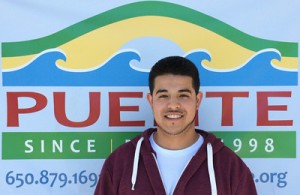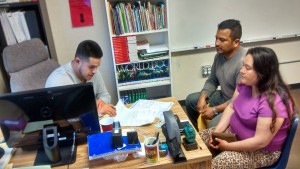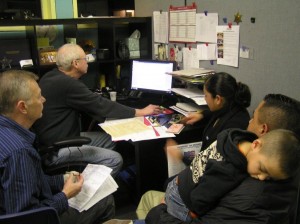Sometimes the best surprises are the ones that arise from doing the right thing. That’s what made Omar Ortega’s first tax refund such an unexpected, and pleasant experience. It was just a check for $50, but Ortega, then 16 years old, was shocked. “I was ecstatic. Even getting that little amount was great to me,” he recalls. He doesn’t remember what he spent the money on, but he does remember the reaction he got at school when he told his friends about it. “Seeing their faces when I told them, they were like, ‘Wait, I can do that? No way!’… It was a good feeling.”

Omar Ortega
Ortega, now 21, has been filing his tax returns using Puente’s free tax prep services starting during his earliest working days as a Puente Summer Youth Program employee. This year he came full circle as the newly minted Site Coordinator for Puente’s tax program. He still thinks tax refunds are a great incentive, although tax-related meetings and trainings – which he has had to spend a lot of his time on – are not. His favorite part of helping people file their taxes is revealing the size of their refunds, a happy surprise. Then, when they go to pay for their tax prep, he reminds them that the Puente services are free.
Puente helped 79 local families and individuals file taxes this year, roughly on par with last year’s clientele. Altogether, they earned $89,946 in federal returns and $16,614 in state refunds. The people served have ranged from single contract workers to families earning a dual income with multiple dependents. Some were English speakers, some Spanish-only.
Like most people, Luis Flores and his wife were not exactly looking forward to tax time. But by the end of their tax session at Puente, they were feeling very relieved. “Our experience went better than we thought, as we weren’t expecting a refund. However we did receive a refund, and that made us really happy. The people at Puente have great people skills, and made us feel comfortable,” says Flores.
Many – nearly half – of those who filed are unauthorized immigrants who live in the community, according to Ortega. They used an Individual Taxpayer Identification Number, or ITIN, rather than a Social Security number to file.
“We’ve had several people, including those with Social Security numbers, go back and file their taxes from past years as well,” observes Ortega. What accounts for the enthusiasm? “They want to do their taxes the right way. They want to be law-abiding citizens and be able to feel good about themselves.”
Filing taxes is required for those not authorized to work in the U.S. if they are making more than $10,000 annually. People who file tend to see it as an investment. They believe it creates a paper trail that could help them demonstrate that they are honest and also help to prove their residency, should Congress pass a comprehensive immigration reform law of which DAPA is a step but is not the final solution. The government says it does not keep track of the immigration status of anyone who files. In 2011, the most recent year available, the U.S. government issued 1.6 million ITINs. Not all are used for tax purposes, but often double as identification numbers for bank accounts and other forms of registration like health insurance.
Some people who don’t file their taxes are passing up an opportunity to see a refund, says Ortega. Meanwhile, those who are on payroll, but using invalid Social Security numbers instead of being paid under the table, already have their wages garnished by the government. They pay into a pool that benefits U.S. citizens, but these individuals do not enjoy any of those public benefits themselves.
This year’s tax return included questions about health insurance for the first time, under provisions of the Affordable Care Act. Those who answered ‘no’ on the health insurance form received a unpleasant surprise: they were fined $95 per adult or 1% of their income, whichever was greater in 2014.
“There were a lot of people who did not know, even though they had been told all of last year that come tax season, they were going to be charged if they didn’t have health insurance.” says Ortega. The penalty will continue to increase every year that they don’t have health insurance.
Others did know about the penalty but had already decided to take a gamble and pay it, rather than enroll themselves and their families in a program under the Affordable Care Act. But why? Ortega explains that these families often fall into a troubling gray area: they earned slightly too much in 2014 to qualify for Medi-Cal, which is free–yet they don’t earn enough to feel they can afford health insurance under Covered California.

Omar Ortega, left, meets with Miguel Gomez and Catalina Robles.
“It was hard telling people that their refund was going to be smaller, or that they had to pay because of that,” says Ortega. The gamble may not pay off next year, when the penalties increase to $325 per person.
For more than a year, Puente has mounted a major outreach drive to enroll people in some kind of health insurance program, whether it is Covered California, Medi-Cal, or county programs for undocumented individuals like ACE or Healthy Kids. More than 200 South Coast residents did sign up, thanks to those efforts. And Puente staff is not done yet. In fact, Ortega says that in several cases, when clients finished filing their taxes last week, they were referred directly to Monica Amezcua and Laura Rodriguez, the Community Resource Navigators who handle health insurance enrollments.
“They need the health insurance, and we will make sure they get signed up for an appointment,” he says. If you live on the South Coast and need health insurance please contact Puente at (650) 879-1691 for more information and/or to make an appointment.

 He also happens to be undocumented.
He also happens to be undocumented.




